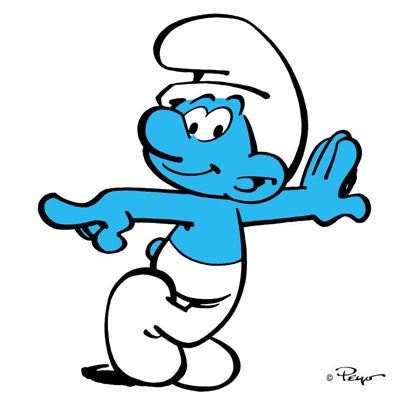Smurfs celebrate their 50th birthday

Long, long ago, in a forest far away, there lived, in complete harmony with nature, a small blue people.
Or if you prefer: "Long, long ago, in a Smurf far way, there Smurfed, in complete Smurfiness with Smurf, a small blue people. The Smurfs."
The Smurfs, originally "schtroumpfs", are a timeless race of blue Belgian elves, who began as a lunch-time accident and went on to conquer the world. They speak an odd language in which the word "Smurf" appears at random. Although allegedly "timeless", they celebrate their 50th Smurfday tomorrow.
Smurfs were Belgian comic strip characters, who became a worldwide success - and cult - after they were turned into a children's TV cartoon series by the Hanna-Barbera studio in Hollywood in the 1980s. Smurf comic books have sold 25,000,000 copies in 25 languages.
Although timeless, Smurfs were ahead of their time. They live in mushrooms and protect their forest from evil, but stupid, enemies who want to become rich by laying waste to everything. In other words, Smurfs were amongst the first militant environmentalists. Long before the Wombles of Wimbledon Common, they were teaching children to protect nature. They are blue… but also green.
For their 50th anniversary, there is to be a full-length Hollywood movie, and a new TV series, both using three-dimensional, computer-generated animation techniques. There is also to be a social revolution in the macho world of the Smurfs: a proliferation of "Smurfettes".
Until now there were 101 male Smurfs, and only one female, the pretty but rather dotty, Smurfette. The blue elves share everything, including baby-sitting duties as the joint parents of the one Smurf baby (imaginatively named Baby Smurf). They obey, usually, the ancient folk wisdom of their leader, Papa Smurf, and the 500-years-old Grandpa Smurf.
In both the new movie and new comic books, the number of female Smurfs is set to explode, responding to one of the most frequent criticisms of Smurfdom. Hendrik Coysman, the head of IMPS, the Belgian company which owns the rights to the Smurfs, says that, timeless or not, even elves have to move with the times.
"There have been dramatic changes in socio-cultural values in the past 20 to 25 years," he said. "One of these is girl empowerment. So, there will be a greater female presence in the Smurf village. This will, of course, be a basis for new stories which will probably turn upside down certain traditional situations…"
Like most good, or bad, ideas the Smurfs were invented over lunch. One day in 1958, a Belgian cartoonist Pierre Culliford - whose father was British - was eating with another Belgian cartoonist. He could not remember the word for salt-cellar and asked his friend to pass him the "schtroumpf".
The "schtroumpfs", later "Smurfs" in English, went on to make Pierre Culliford, or "Peyo", rich and famous. They also, he often complained before his death in 1992, drove him mad. He could not understand why the irritating, little blue elves thrived and his other inventions faded.
Opinions on the Smurfs - good/evil, charming/exasperating, funny/tedious - tend to be equally divided. Few children's cartoon characters have generated such adoration and such hatred.
Conspiracy theories have long abounded. The 102 different Smurfs - Brainy Smurf, Hefty Smurf, Greedy Smurf, Chef Smurf etc - share all possessions. Each has his own fixed role in society. Since Papa Smurf has a white beard and a red hat, the Smurfs are, according to some American thinkers, subversive crypto-Marxists.
Other theories include: the Smurfs are anti-semitic; the Smurfs, who wear pointed hats, are a front for the Ku Klux Klan; the Smurfs are neo-Nazis; the Smurfs are a Hindu conspiracy/prophecy to prepare the world for the triumph of Krishna.
It falls to Pierre Culliford's son, Thierry, 52, to defend his father's creation. There is nothing remotely political about the Smurfs, he insists. His father had no interest in politics. The only message that the blue elves promote is "love and friendship". Their success is explained, he says partly, by their universality. "They live in the Middle Ages ... They don't live in the 50s, 60s, 70s or 80s so the clothing or their look doesn't change. After 50 years, they are still as popular as ever with children of 10 or seven or five."
Despite the proud claim at the start of each cartoon strip that they live "in harmony with nature", neither IPSM nor M. Culliford have any plans to draw attention to the Smurfs' green credentials. So many dotty political theories abound about the Smurfs that their artistic and commercial masters prefer to stay clear of politics altogether.
Subscribe to Independent Premium to bookmark this article
Want to bookmark your favourite articles and stories to read or reference later? Start your Independent Premium subscription today.

Join our commenting forum
Join thought-provoking conversations, follow other Independent readers and see their replies